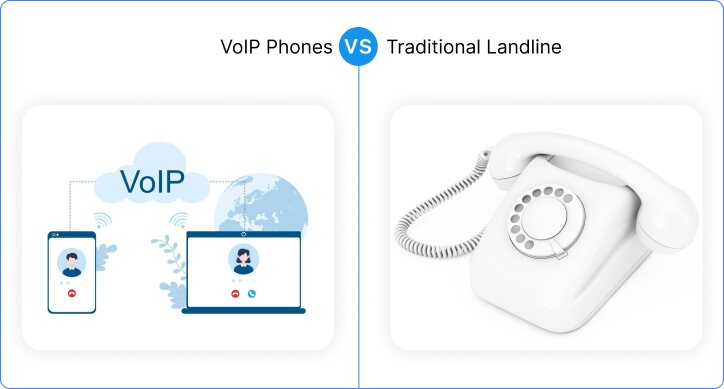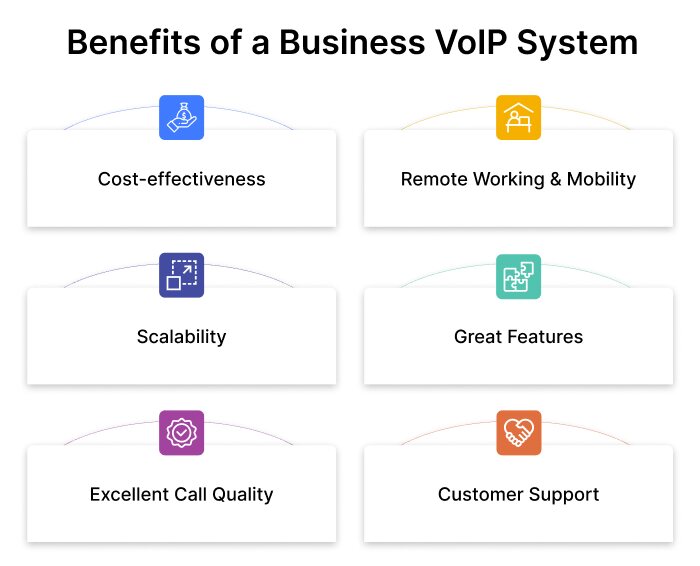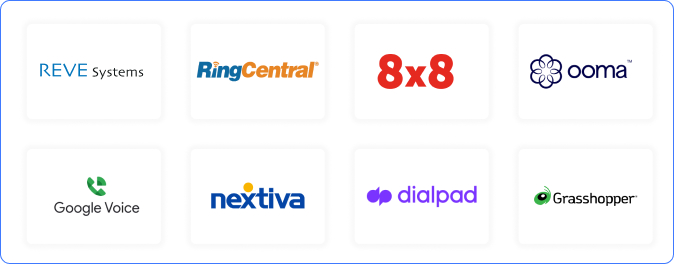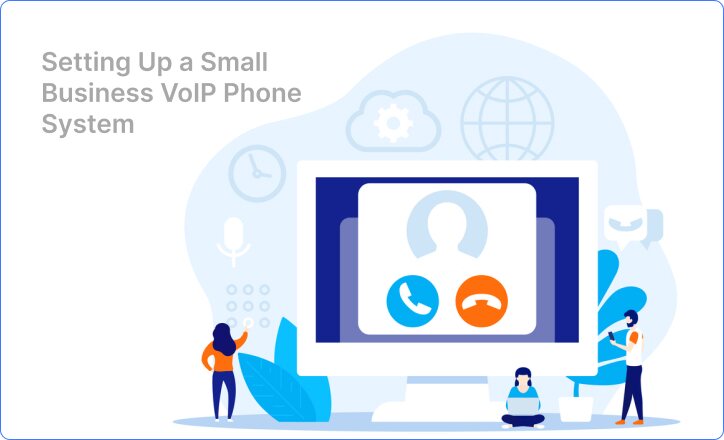
For every startup or small business, effective communication is vital, isn’t it? And that’s where Small Business VoIP comes in. It’s not just about saving money; it’s about leveling the playing field against bigger competitors. VoIP lets you run your business from anywhere with an internet connection.
But before we dive in, let’s clarify what VoIP is. Voice over Internet Protocol (VoIP) simply means making phone calls over the Internet. It’s scalable, affordable, and keeps your business running smoothly. In this guide, we’ll explore why VoIP is a game-changer and share the top providers in the market. Ready to revolutionize your business communications? Let’s get started!
What is Small Business VoIP?
Small business VoIP is a modern phone system designed for small teams and businesses, enabling voice calls and SMS/MMS text messages over the Internet. Unlike traditional landlines, which rely on copper wires, VoIP utilizes internet connections to transmit digital voice signals as ‘packets’ over an Internet Protocol (IP) network.
This technology allows for greater flexibility and functionality, as VoIP systems often integrate with unified communications platforms, offering additional features like video conferencing and team messaging. By leveraging VoIP, small businesses can not only save costs but also enhance communication efficiency across various channels, meeting the evolving needs of modern consumers.
How VoIP Phone Systems are Transforming Business Communication
According to the Center for Disease Control (CDC) in the US which tracks phone use as part of its bi-annual health review, landline use has been decreasing rapidly and now it’s below 40%.
The advent of smartphone technology has revolutionized communication, prompting businesses to shift from traditional landline calling to small business VoIP systems. These internet-based phone solutions offer convenience and accessibility, catering to customers’ evolving technology preferences.
As businesses expand, aligning with these expectations becomes crucial, as it directly impacts brand perception. Moreover, small business VoIP phones come equipped with powerful features that enhance communication capabilities, enabling businesses to make a significant impression on clients and customers alike.
VoIP Phones vs. Traditional Landlines

The primary distinction between VoIP and landline phones lies in their underlying technology.
Landline phones, which have remained relatively unchanged since the early twentieth century, rely on a physical infrastructure of wiring and exchange hardware. This technology is inherently limited by today’s standards, enabling users to engage solely in voice-based communication.
In contrast, VoIP technology has revolutionized business communication. While IP capabilities have existed for decades, advancements in phone innovation and faster internet speeds have propelled business VoIP services forward in recent years.
Unlike landline phones, which often require additional add-ons for enhanced features at extra cost, modern business VoIP systems come equipped with a wide range of popular communication features already integrated into the system.
Virtual Receptionist
Imagine your Virtual Receptionist as the empowered gatekeeper of your business, armed with VoIP technology to welcome callers seamlessly and efficiently. With personalized greetings and smart call routing, it ensures every interaction is polished and professional. Whether guiding callers to the correct department or individual, your Virtual Receptionist leverages VoIP capabilities to create a seamless experience, leaving a lasting impression of reliability and exceptional service.
By harnessing VoIP’s features for customization and optimized call handling, your Virtual Receptionist becomes a powerful asset in enhancing customer satisfaction and building strong relationships with your clientele.
VoIP Mobility
For small businesses, staying connected on the move is crucial. Small business VoIP solves this by offering dedicated business numbers through mobile apps. With a mobile app, employees can work from anywhere, using their work number. This means sales associates can assist customers on the go, field reps can stay productive between appointments, and project managers can answer calls whether in the office or on-site. VoIP mobility enhances flexibility, productivity, and seamless communication for small businesses.
Conference Calling
For small businesses operating in the digital age, the reliance on VoIP technology for conference calling is undeniable. These calls serve as vital avenues for collaboration, connecting team members, clients, and stakeholders regardless of geographical location. Given the significance of these interactions, the quality of sound becomes paramount.
A robust conference phone equipped with features like 360° voice range, multiple built-in microphones, and advanced noise cancellation ensures that every participant enjoys clear and crisp audio. Moreover, the versatility of IP conference phones, offering both Bluetooth and Ethernet connectivity options, empowers businesses to tailor their setup to their specific needs, guaranteeing seamless and successful conference calls every time.
Benefits of a VoIP System for Your Business

Look around and you will see that small businesses are increasingly turning to VoIP systems to streamline their communication processes and enhance productivity. Let’s explore the advantages of implementing a small business VoIP system:
1. Cost-effectiveness
VoIP systems eliminate the need for costly hardware installations and maintenance associated with traditional phone lines, resulting in substantial cost savings. Additionally, VoIP providers often offer competitive pricing plans and affordable international calling rates, further reducing communication expenses.
2. Remote Working & Mobility
With VoIP, employees can seamlessly work from anywhere with internet connectivity. Whether they’re in the office, at home, or on the go, they can access the VoIP system through desktop or mobile applications, ensuring uninterrupted communication and collaboration.
3. Scalability
Small business VoIP systems are highly scalable, allowing you to easily add or remove users as your business grows or requirements change. You can expand your phone system without the need for additional physical infrastructure, making it a flexible solution for businesses of all sizes.
4. Great Features
VoIP systems offer a wide range of features beyond traditional calling, including video conferencing, team messaging, call recording, and auto-attendant. These features enhance productivity, streamline communication, and improve customer service, empowering your business to operate more efficiently.
5. Excellent Call Quality
Advancements in VoIP technology and internet speeds ensure excellent call quality, with clear audio and minimal disruptions. Whether you’re conducting internal meetings or interacting with clients, you can rely on consistent and reliable communication.
6. Customer Support
Opting for a reputable VoIP provider ensures access to dedicated customer support services, available round-the-clock to address any technical issues or queries. This level of support instills confidence and provides reassurance that your communication system is always well-maintained and operational.
8 Best Small Business VoIP Providers

REVE Systems
REVE Systems stands as a reputable IP telephony & Software Solution provider, trusted by a multitude of small and medium-sized enterprises, alongside major telco brands. Renowned for its expertise in Small Business VoIP solutions, the company has secured a prominent position within the industry, offering a comprehensive suite of scalable and fully customizable communication services.
What distinguishes REVE in the market is its unwavering commitment to customer satisfaction, evident in its tailored approach to software development, customer support, and pricing models. By prioritizing the unique needs of each client, REVE Systems facilitates the optimization of communication infrastructure, empowering businesses to thrive in the dynamic landscape of VoIP.
Features for Small Businesses:
- Fully customizable VoIP solution for businesses
- Voice and video calling
- Dedicated support when needed
- Wide range of OS and device support
- Ready-to-offer mobile app
- Exclusive feature set
Price:
Pricing depends on specific needs and business scale
RingCentral
Another Small Business VoIP phone service provider offering cutting-edge technology is RingCentral, which seamlessly integrates phone, messaging, and video into one platform. Ideal for businesses of all sizes, RingCentral ensures connectivity across devices and empowers streamlined communication both internally and with customers.
With all-inclusive plans featuring unlimited calling, messaging, video meetings, and more, RingCentral caters to diverse business needs. Despite its focus on phone and video, businesses may need to explore third-party integrations for additional channels and functionalities.
Features for Small Businesses:
- Available in over 110 countries
- Provides a toll-free number
- Real-time analytics
- Interactive voice response (IVR)
- Conference call
- Enhanced business SMS
Price:
The basic plan is around $30 per month
8×8
Offering comprehensive Small Business VoIP plans, 8×8 integrates essential features like voice, chat, virtual meetings, and internet fax. With cost-effective pricing options and a free trial, businesses can access a unified communication experience through a single app or browser. While lacking some advanced features, the platform remains competitive in the SMB VoIP space, focusing on Unified Communications as a Service (UCaaS) for efficient calling and conferencing solutions.
Features for Small Businesses:
- Auto-attendant system
- Visual voicemail
- Call monitoring
- Voicemail to email
- SIP Phone support
- Rich analytics and insights for every interaction
- Unlimited video conferencing
Price:
$15-$55, based on plan, specific business need and scale
Ooma
With a focus on efficient office communication, Ooma offers a standout VoIP solution for small businesses. Its support for intercom calling and overhead paging facilitates seamless discussions across multiple locations, while features like hot desking enable flexible employee access.
Ooma’s scalability ensures it grows with your business, providing essential features like virtual receptionists, toll-free numbers, and call blocking. While not as feature-rich as some competitors, Ooma’s affordability and user-friendly setup make it an appealing choice for small businesses seeking cost-effective communication solutions.
Features for Small Businesses:
- Can set business hours to route calls as needed
- Free local phone number
- Virtual receptionist
- Enhanced call blocking
- Analytics user leaderboard
- Video conferencing
Price:
The basic plan is $19.95 per month
Google Voice
Recognized for its user-friendly interface and affordability, Google Voice is an optimal choice for solopreneurs and startups in need of a small business VoIP solution. Offering a free plan tailored to individual users, Google Voice provides unlimited domestic calling and text messaging, along with convenient voicemail transcription.
For those seeking more advanced features, its paid packages remain cost-effective, starting at just $10 per user per month. Integrated seamlessly with Google Workspace, Google Voice ensures easy access to calls, texts, and voicemails across various devices, including smartphones and laptops. While it may lack some advanced functionalities, its simplicity makes it an ideal option for small businesses prioritizing ease of use and budget-friendly solutions.
Features for Small Businesses:
- Multi-level auto-attendant
- Ring groups
- Call recording facility
- Integration with other Google products
Price:
Starts with $10 per user per month
Nextiva
With a comprehensive suite of communication tools, Nextiva stands out as a top choice for businesses seeking a reliable VoIP solution. Offering unlimited calling, texting, and internet faxing, along with user-friendly softphone apps, it’s ideal for remote workforces. Despite not being the cheapest option, Nextiva’s reliability and security make it a trusted partner for businesses of all sizes.
Features for Small Businesses:
- Sells and leases phones
- 99.999% uptime
- Efficient support team whenever needed
- Free toll-free, virtual voicemail, & auto attendant
- Conversational AI
- Call analytics, Call Monitoring, and Call park
Price:
Around $30 per user per month
Dialpad
Dialpad stands out among Small Business VoIP providers with its innovative approach and essential business phone features. Powered by AI technology, its customer support functionalities offer real-time transcriptions and live coaching, enhancing user experience. Although additional features like additional phone numbers come at an added cost, Dialpad’s focus on innovation makes it a compelling option.
From startups to global enterprises, its user-friendly desktop and mobile app cater to businesses of all sizes, offering video meetings, SMS, MMS messages, and more. With AI transcribing meeting notes and calls, Dialpad simplifies communication workflows, eliminating the need for manual note-taking.
Features for Small Businesses:
- Free trial for 2 weeks
- 100% uptime SLA
- Unlimited outbound calling in the US and Canada
- Unlimited video meetings
- Video Conferencing
- Voicemail Transcription
- AI assistant takes notes and transcribes calls
Price:
$15-$35 per user per month
Grasshopper
Catering specifically to the requirements of self-employed professionals and small businesses, Grasshopper specializes in providing a seamless phone solution. It enables users to incorporate a business phone system effortlessly into their devices, eliminating the necessity for separate hardware investments.
Grasshopper boasts a user-friendly interface, enhancing usability with essential features like conference calling, CRM integrations, SMS text messaging, call routing, and voicemail transcriptions. However, while Grasshopper excels in offering simplified phone communication solutions, it may not be the ideal choice for businesses seeking a more integrated communication ecosystem.
Features for Small Businesses:
- Free trial available
- Desktop and mobile apps
- Dedicated customer support
- Call forwarding
- Voicemail transcriptions
Price:
$14-$80, depending on business need and scale
Although there are dozens of other Small Business VoIP providers with various features and functionalities, we have listed these 8 down based on features, pricing, and customer reviews. However, it is important to note that the brands here are not listed in any sequential order.
How to Choose the Best Small Business VoIP Provider?

Choosing the right Small Business VoIP provider for your business can be daunting sometimes, but with the right approach, you can find the best fit for your needs. Here are some key considerations to help you choose wisely:
- Essential Features: Ensure the provider offers crucial features like free local numbers, mobile apps, voicemail transcription, and call recording.
- Tailored Solutions: Evaluate providers based on your specific requirements. For scalability and customization, choose REVE Systems; for national clientele, look at Nextiva.
- User Input: Involve stakeholders in the decision-making process to ensure the chosen solution aligns with their needs and preferences.
- Reliability: Assess providers’ track records for call quality, uptime, and customer support through references and online reviews.
- Cost-effectiveness: While cost matters, prioritize value over the cheapest option. Look for transparent pricing and flexible plans.
By considering these factors, you can confidently select a Small Business VoIP provider that meets your needs and supports your business growth.
How to Setup a Small Business VoIP Phone System?

Setting up a Small Business VoIP Phone System involves several key steps to ensure a seamless transition to the new communication platform:
Step 1: Assess Your Needs
Begin by evaluating your business requirements. Determine the number of users who will need access to the system and the specific features essential for efficient communication. Consider features like call forwarding, voicemail, conference calling, and mobile accessibility. Understanding your needs upfront will help you choose the right VoIP provider and plan.
Step 2: Choose a Provider
Once you’ve identified your requirements, research and select a reputable VoIP provider that offers the features you need at a price point that fits your budget. Look for providers known for reliability, excellent customer service, and user-friendly interfaces. Consider factors such as call quality, scalability, security features, and integration capabilities with existing business tools.
Step 3: Purchase Equipment
Depending on your chosen VoIP provider and the setup you prefer, you may need to purchase specific hardware such as IP phones, headsets, or adapters. Ensure that your internet connection meets the system requirements for VoIP calls, as a stable and high-speed connection is essential for clear voice quality and smooth performance.
Step 4: Set Up Hardware and Software
Once you have all the necessary equipment, proceed with setting up the hardware and installing the VoIP software. Connect your IP phones or headsets to your internet network and configure them according to the provider’s instructions. Install the VoIP software on your computers, laptops, or mobile devices, and follow the setup wizard to configure user accounts and preferences.
Step 5: Test and Troubleshoot
After the hardware and software setup is complete, conduct thorough testing to ensure that all features are working correctly. Make test calls, check voicemail functionality, and test other features such as call forwarding and conferencing. If you encounter any issues or challenges during the setup process, reach out to your VoIP provider’s customer support team for assistance. Addressing any issues promptly will help ensure a smooth transition to your new VoIP phone system.
Conclusion
In wrapping up our journey through this comprehensive blog on Small Business VoIP, it’s clear that embracing this technology opens a world of possibilities for modern businesses. From simplifying hardware requirements to ensuring seamless connectivity, each step brings us closer to harnessing the full potential of VoIP communication.
By carefully considering your business needs, selecting the right provider, and executing a smooth setup process, you pave the way for enhanced collaboration, improved customer service, and increased efficiency. With Small Business VoIP, you’re not just upgrading your phone system; you’re revolutionizing the way your business communicates.




























